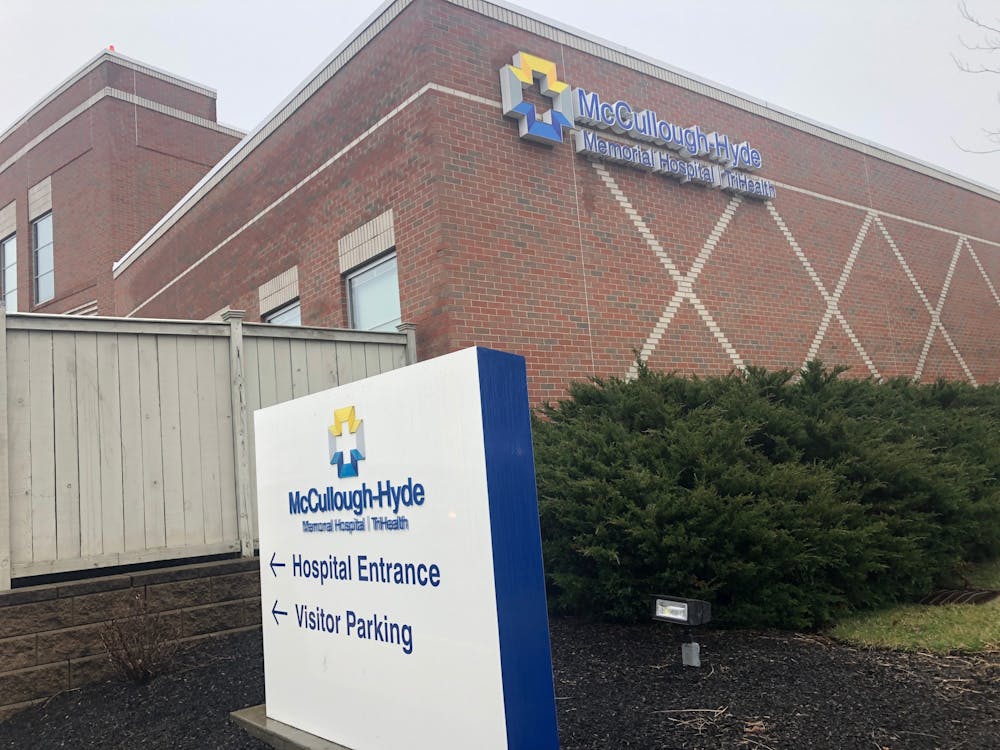For almost a year, Vicki Raible has been at the front line of the COVID-19 pandemic.
For weeks at a time, she didn't even enter her own home in fear of exposing her family to the virus. Instead, she lived in a camper parked on their driveway. She only talked to them over the phone.
Raible was one of the countless nurses who treated the nearly 4 million Americans hospitalized with COVID-19 over the past year.
Raible, who has been a nurse at McCullough-Hyde Memorial Hospital for 26 years, said she never expected anything like COVID-19.
“You learn about smallpox and other epidemics that have happened in the past,” Raible said. “You never dreamed of it because you had so much faith in the science and the medicine world. You think we can come up with solutions for everything.”
As McCullough-Hyde began to see COVID patients, Raible said she and others had concerns about the safety of their protective equipment and the effectiveness of their treatment methods due to the unknown nature of the virus. Despite this, they chose to treat patients as much as they were able to.
“When it started, team members stood at the ready and were very nimble,” Raible said. “But you could see the fear and anxiety that was present with them, especially initially … I never had anybody say, ‘I'm not coming to work because I'm afraid,’ but you could certainly see a little bit of uncertainty in their faces.”
Raible said the gravity of the situation first struck her when patients began falling seriously ill with the virus, needing treatments such as intubation or ventilation.
“They may have been a patient who we had seen earlier, who we may have seen a day or two prior, and they were not ill enough, they didn't meet criteria to stay in the hospital,” Raible said. “Patients being awake and asking for you to help them, agreeing to be on a ventilator because they're struggling so hard to just take that next breath or to feel like they're getting enough oxygen [made me realize how serious this was].”
Raible said nurses were able to adopt better strategies as research progressed and new treatments were discovered. Some of the most promising were the use of Remdesivir and high-flowing oxygen, which both provided safer and less drastic measures than putting patients on ventilators.
“We have been using high-flow oxygen,” Raible said, “and that keeps the patients off of the ventilator a little longer. They stopped putting people on those mechanical ventilators as quickly once they figured it out. Once they went on a ventilator, it was harder to get them off.”
Raible has two daughters, one of whom is a college student with asthma. As asthmatics are particularly vulnerable, Raible had to take extra precautions so as not to endanger her daughter.
Enjoy what you're reading?
Signup for our newsletter
“At the peak, when we were really seeing a lot of patients and having daily contact with people, I had my husband bring our camper over and I stayed the majority of the time in our camper,” Raible said. “If I came in the house, I'd shower out there, and I pretty much sat at the kitchen table with a mask on just because I didn't want to give it to my husband or my daughter if I were positive and not symptomatic.”
While Raible had to separate herself from family for safety, many of her patients had to do the same. Due to the infectivity of COVID, many patients were unable to have visitors.
“It was strange not having family in with patients,” Raible said. “That is not how we practice medicine. We encouraged family members in the past to be present and with their loved ones, and I would say it felt very strange to us to have patients who were really sick and scared, and when you're scared, what makes you feel better than someone who's familiar to you?”
For many of the nurses at McCullough-Hyde, the stress of work was extreme. Raible said many of her co-workers were terrified of the virus.
“I had conversations with other team members who were just genuinely so afraid that it was almost debilitating for them, and then feeling torn between having those feelings and then feeling guilty,” Raible said. “They were so afraid that they felt like it was affecting their nursing ability.”
Despite this fear, Raible said, the work that everyone at McCullough-Hyde puts in is astounding. Even with constantly-changing guidelines and national shortages of equipment, the hospital was still able to treat patients efficiently.
“It's been very humbling for myself to see fellow nurses who put themselves in the front line and trusted the guidance that we were given with PPE,” she said. “When it was at its height, right at the beginning, we were even asking team members to reuse their surgical masks from day to day, reuse their N95 for so many hours of use, and no-one batted an eye and said, 'This isn't fair,' or ‘I'm not working because you can't supply us.’ They knew that they – society and our hospital system – were doing the best they could do to get us what we needed.”




